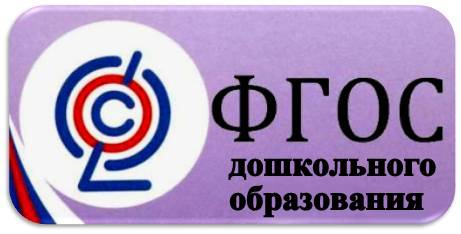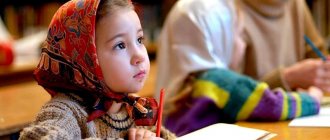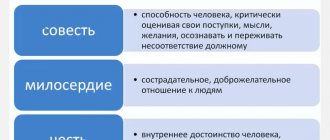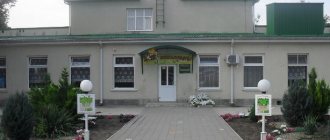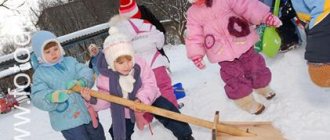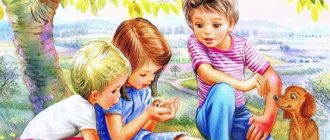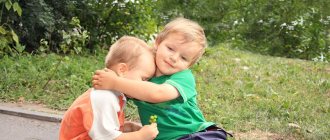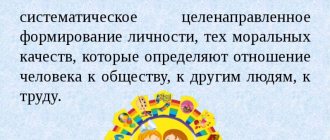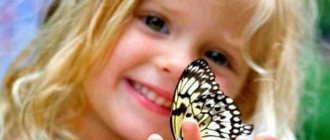Concept
The concept of spiritual and moral education of preschool children consists of several terms. Spirituality traditionally means a characteristic of the soul where spiritual, moral and intellectual interests prevail over material interests.
The concept of morality refers to a person’s ability to accept responsibility for his actions and act in accordance with his conscience. As you know, the foundations of spirituality and morality are laid in childhood.
The spiritual and moral education of preschool children in the Russian Federation is carried out in compliance with certain standards
Preschool age is the period from 3 to 7 years. Within this period there is a smaller division, which involves the presence of younger preschoolers, as well as middle and senior preschoolers.
If in early preschool age spiritual and moral education is primarily carried out by parents, then the senior and middle preschool age of children involves inclusion in the sociocultural environment and full development within the framework of federal educational programs based on educational institutions.
Goals and objectives
The spiritual and moral education of preschool children within the framework of the Federal State Educational Standard is based on the principle of actively introducing children to the norms of a sociocultural nature, the traditions of the family, society and the state.
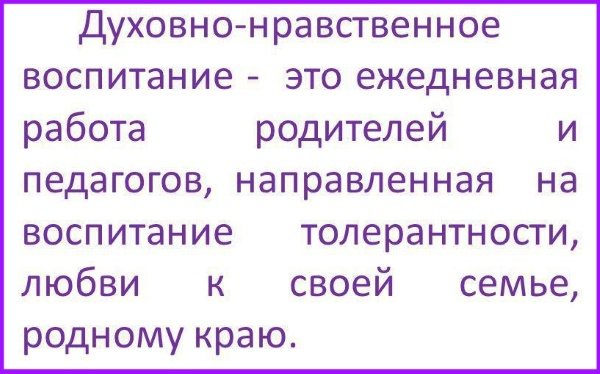
Objectives of the standards:
- combining processes such as training and education into one process;
- formation of a general culture of children’s personality;
- searching for the spiritual giftedness of each child;
- formation in the child of such a concept as patriotism;
- demonstrative demonstration of the fundamentals related to the historical past;
- protecting and simultaneously strengthening the physical health of children.
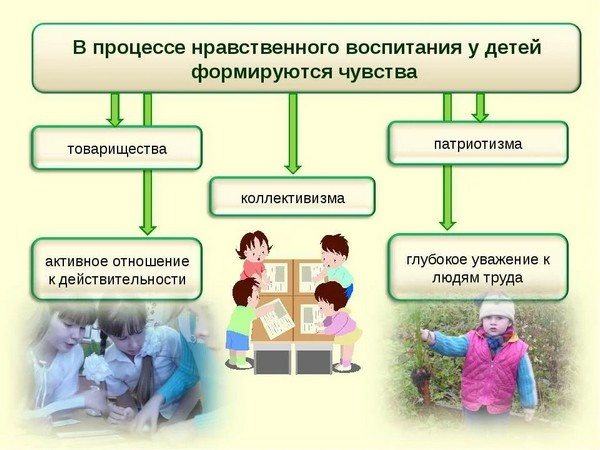
The federal standard sets several goals for educators:
- education of empathy;
- formation of values;
- communicating to children, through images and techniques they understand, information about the basics of civic and cultural identity.
Article “SPIRITUAL AND MORAL EDUCATION OF PRESCHOOL CHILDREN IN THE CONDITIONS OF IMPLEMENTATION OF THE FSES DO.”
SPIRITUAL AND MORAL EDUCATION OF PRESCHOOL CHILDREN IN THE CONDITIONS OF IMPLEMENTATION OF THE FSES DO.
Natalya Borisovna Gribkova, teacher of the MKOU "Novozhiznensky kindergarten ORV" (Structural unit of the MKOU Novozhiznensky secondary school)
“Let the child feel the beauty
and admires her
let it be in his heart and memory
images will be preserved forever,
in which the Motherland is embodied."
V.A. Sukhomlinsky.
Preschool childhood is an important period in a child’s life, when a sense of their own capabilities, the need for independent activity, basic ideas about the world around them, good and evil in it, ideas about family life and their native land are formed. That is why at present it is extremely important to create a normally functioning system of spiritual and moral education in preschool institutions; a system built on the values of traditional spiritual culture, meeting the needs of the child’s personality development and aimed at developing a physically, mentally (mentally) and spiritually healthy person. The catchphrase “It all starts in childhood” fits perfectly with this question. When thinking about the origins of moral feelings, we always turn to the impressions of childhood: the trembling of lace from young birch leaves, and native tunes, and the sunrise, and the murmur of spring streams. Nurturing a child’s feelings from the first years of life is an important pedagogical task. A child is not born evil or good, moral or immoral. What moral qualities a child will develop depends, first of all, on his parents, teachers and the adults around him, on how they raise him and what impressions they enrich him with.
Recently, Russian society has become very acutely aware of the lack of principles and rules of life consciously accepted by the majority of citizens, the lack of agreement in matters of correct and constructive social behavior, and the choice of life guidelines. The present and future of our society and state are determined by the spiritual and moral health of the people, the careful preservation and development of their cultural heritage, historical and cultural traditions, norms of public life, and the preservation of the national heritage of all the peoples of Russia.
Therefore, at the present stage of development of education, spiritual and moral education is one of the most important tasks in educating the younger generation.
The relevance of this task in modern Russia is also reflected in the Federal State Educational Standard for Preschool Education. The methodological basis for the development and implementation of the Federal State Educational Standard for Preschool Education was the Concept of Spiritual and Moral Development and Personality Education of a Russian Citizen. The problem of spiritual and moral education is presented in the Federal State Educational Standard for preschool education in the logic of value and sociocultural approaches.
The Federal State Educational Standard for Preschool Education puts forward as one of the fundamental principles of preschool education “the introduction of children to sociocultural norms, traditions of the family, society and state.”
The standard is aimed at solving a number of problems, including “combining training and education into a holistic educational process based on spiritual, moral and sociocultural values and socially accepted rules and norms of behavior in the interests of the individual, family, society”, “formation of a common culture the personality of children, including the values of a healthy lifestyle, the development of their social, moral, aesthetic, intellectual, physical qualities, initiative, independence and responsibility of the child..."
The value and sociocultural aspects are highlighted in the following formulations:
-principles of preschool education;
— tasks to be addressed by the Federal State Educational Standard for Education;
— characteristics of the content of the educational program in educational areas;
— requirements for the conditions for the implementation of the educational program of preschool education and the developing subject-spatial environment of preschool education;
— main target guidelines (socially normative age characteristics of a child’s possible achievements at the stage of completion of preschool education)
Value and sociocultural aspects are highlighted in the characteristics of all five educational areas of preschool education
-The basis of social and communicative development is designated as “the assimilation of norms and values accepted in society, including moral and ethical values.”
-Included in the list of primary ideas formed in preschoolers during cognitive and speech development,
a number of sociocultural categories are included: ideas “about the small homeland and Fatherland”, “about the sociocultural values of our people”, “about domestic traditions and holidays”.
-Artistic and aesthetic development in the context of the Federal State Educational Standard of preschool education “involves the development of prerequisites for the value-semantic perception and understanding of works of art (verbal, musical, visual), the natural world” as the basis for the development of the moral ability to distinguish between good and evil and the aesthetic ability to distinguish between the beautiful and the absurd, as well as promoting the formation of an appropriate attitude towards the phenomena of the surrounding world.
—
Physical development also involves promoting the formation of the value-semantic sphere of the child’s personality (“the values of a healthy lifestyle”)
Spiritual and moral education is a long-term process, involving an internal change in each participant, which can be reflected not here and not now, in preschool childhood, but much later, which makes it difficult to assess the effectiveness of the activities carried out, but does not reduce the significance of our work. Work on the spiritual and moral education of children is based on the “Basic general educational program of preschool education”, ed. N.E. Veraksy, T.S. Komarova, M.A. Vasilyeva.
Goals and objectives of spiritual and moral education in preschool educational institutions:
Main goal
Spiritual and moral education is the education of the child’s spiritual and moral personality, facilitating his acquisition of moral, sought-after spiritual experience based on the traditions of Russian Orthodoxy.
Tasks:
- introducing children to the traditional spiritual and moral values of Orthodox Russia,
- revealing the child’s spiritual giftedness and his personal gifts,
- activation of positive, harmonious, hierarchically built relationships of the child to the social world of adults and peers, to the environment, mediated by the relationship to the Creator,
- formation of civic consciousness, love for the Motherland and the Russian people,
- protection and strengthening of mental, spiritual and physical health of children,
- creation of an inspired play and educational space for the child’s life.
Our kindergarten group has a corner for spiritual and moral education of children. Here you can find literature for children ("children's Bible", stories and parables, epics, fairy tales, poems, world books, coloring books for children), literature for parents and teachers, audio cassettes and video materials, demonstration and handouts for OD, books with Russians, folk outdoor games, illustrations.
The main areas of work with preschool children
are local history, familiarization with the native country, the historical past of Russia, organization of children’s lives according to the folk calendar.
1. Material for introducing children to the “small homeland”, their native land. Illustrations, photographic materials, thematic folders on topics:
- "Nature of the native land"
- "Anna after a century"
- "Temples of the Voronezh land"
- “Sights of Voronezh”, etc.
2. Introducing to the origins of Russian folk culture. Illustrations and thematic folders by topic:
- "How people lived in Rus'"
- "How our ancestors grew bread"
- "Where does everything come from"
- "Russian folk costumes"
- "Russian Orthodox holidays"
- "Russian folk toys"
- "People's calendar";
- "Icons"
- antiques (painted spoons, scarves, embroidery, patchwork blanket, lace, etc.),
- Russian toys (Voronezh, Dymkovo toys, nesting dolls, etc.),
- objects of folk arts and crafts,
3. Spiritual and moral education - material that gives children an initial idea of Orthodoxy - this is a selection of illustrations depicting churches and their architectural features, an album is designed: “Temples of the city of Voronezh”, Orthodox calendars for children, a selection of postcards on the theme “Russian icon”) .
4. Fiction on folklore (fairy tales, epics, legends).
Materials were selected and analyzed in various areas of the spiritual and moral development of children according to age, which were systematized into sections:
— Orthodox holidays in kindergarten;
— productive activity in spiritual and moral education;
— advisory and information material for parents;
— gaming activity in spiritual and moral education.
Open demonstrations of OD were organized, which made it possible to master practical methods and techniques of working with children on spiritual and moral education in various types of children's activities.
Integration of the spiritual and moral content of education occurs in various types of children's activities:
— gaming: conducting finger games, role-playing games.
- didactic: “Orthodox holidays”
-constructive: “Lay out from sticks”, “Making postcards”.
-verbal, active, fun games, folk and round dance games.
In organizing role-playing games, the moral side of role-playing interaction is taken into account: the doctor not only treats the sick, he empathizes, shows mercy and compassion, the teacher is patient and friendly, the seller is honest and conscientious;
- productive activities: making crafts for relatives and birthday people, for Orthodox holidays, drawings based on works of art;
— theatrical activity allows you to embody moral feelings in simulated situations (“What would you do”), (“Let’s make peace”…)
5. Work with parents: includes information about Orthodox holidays and family traditions, offers literature for family reading, advisory material on the spiritual and moral development of children, periodically thematic exhibitions of crafts and drawings are held. Memos and consultations have been developed on topics about the rules of behavior in the church, Orthodox holidays, and others. (Introducing children to the origins of Russian folk culture.)
In our kindergarten we are trying to create all the necessary conditions for carrying out work in this direction, to increase our spiritual and moral potential and professional competence in matters of Orthodox education of preschoolers, to interest parents in the spiritual life of the child, parents are involved in the activities of the kindergarten aimed at spiritually moral development of children, we also conduct surveys of parents on the spiritual and moral education of children.
Forms of work on spiritual and moral education:
- reading folk tales, tales of maternal love;
— OD called “We are kind”, the purpose of which is to educate moral values and self-knowledge in the world of people;
- acquaintance with calendar Orthodox and folk holidays and holding some of them (Nativity of the Blessed Virgin Mary, Christmastide, Maslenitsa, Easter, Annunciation, Trinity)
-conversations on moral topics (about forgiveness, hard work, respect for elders),
— thematic exhibitions of children's creativity.
First, people learn Christian love in their own family, then - towards all loved ones, and then towards all people, therefore we begin our work on spiritual and moral education with the cultivation of love for mother through:
- reading fairy tales that most clearly show the power of a mother’s love, her wisdom, sacrifice for the sake of her child, which teach children to understand the importance of their help to their mother, to be attentive to her: “Cuckoo” Nenets fairy tale, “Ayoga” Nanai fairy tale, “Bread yes salt" by Alexey Logunov, "Mother's Love" Korean fairy tale.
- conversations: “There is no sweeter friend than your own mother”, “Tell me about your mother”
— viewing postcards: “The image of a loving mother in the icons of the Blessed Virgin Mary”,
participation of children in the regional event “Week of Kindness”;
- memorizing poems about mother, making gifts for mothers and grandmothers;
- creative works - portraits of mothers or the whole family from different materials;
— joint events for children and mothers.
In the course of such work, children increasingly understand the connection between their behavior and the mood of their mother and loved ones.
As the child develops, he cannot “assert himself at all.” He asserts himself necessarily on the basis of some impressive examples. The Russian cultural tradition sacredly preserves the images of heroes - defenders of the Fatherland, Orthodox saints. From the stories of the teacher, literature, and historical films, children will learn about the epic Ilya Muromets not only as a real historical figure, but also as a saint of the Russian Orthodox Church. About Dmitry Donskoy, the young Moscow prince, who defeated the huge army of Mamai on the Kulikovo field. Alexander Nevsky (who performed not only a military, but also a spiritual feat) - a brave defender of Rus' from the German and Swedish conquerors.
Throughout the year, we always work on folk and Orthodox holidays, which we introduce children to - Christmas, Maslenitsa, Annunciation, Easter, Trinity, Transfiguration of the Lord.
In the spiritual and moral education of a child, the interaction between the teacher and the family is of great importance. But in most modern families, the way of life in accordance with Orthodox traditions has been lost. The interaction of employees and parents in the spiritual education of children takes place through: educational activities and holidays, joint events of children and mothers, at which pressing issues of raising children are discussed.
We can conclude that the majority of parents (namely 52% according to the survey results) are very concerned about the spiritual development of their children and try to use many opportunities for their moral development.
In our group, children live in a cozy world of warmth and kindness, in a world of spirituality and fantasy. After all, all the best that begins to form in kindergarten will be reflected in later life and will have an exceptional impact on the subsequent development and spiritual and moral achievements of a person.
List of used literature
- Aleshina N.V. Patriotic education of preschool children. - M., 2004
- Kirkos R.Yu. Patriotic education of preschool children. -. -S-Fri., 2005
- “The basic general educational program of preschool education” edited by N.E. Veraksa, T.S. Komarova, M.A. Vasilyeva. M.MOZAYKA-SYNTHESIS, 2012
- Petrova V.I. T.D. Chair. Moral education in kindergarten. - M., Mozaika-Sintez, 2008
- Internet resources.
Pedagogical basics
The spiritual and moral education of preschool children within the framework of the Federal State Educational Standard rests with representatives of preschool institutions, who must work in close cooperation with the parents of each child.
During the educational processes, the following cultural and pedagogical resources are used to achieve goals and objectives:
- literary methods;
- techniques of visual, song, musical, multimedia, local history;
- personal receptions;
- teamwork.
Program requirements
Federal State Educational Standard for Education is a set of mandatory provisions in the education of young children based on many years of experience of teachers. The program presents certain methods that contribute to the spiritual development of the child.
- Social and moral education of preschool children - the assimilation of generally accepted norms, the formation of a positive attitude and respect for others.
- Artistic and aesthetic perception - understanding and perception of art, love of nature, development of creative activity, imagination.
- Speech development is the correct use of the main means of communication with others, enriching vocabulary.
- Moral and patriotic education of preschoolers - the formation of ideas about the Motherland, traditions, values and holidays of the country. Development of cognitive activity and curiosity.
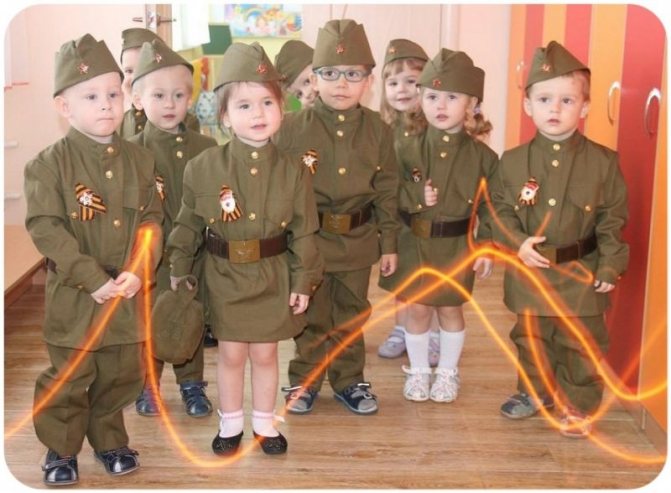
For more productive work with children, the Federal State Educational Standard indicates the need for them to be carried out in the following conditions:
- establishing and monitoring the rules of goodwill between children of different social groups, ages, religions, nations;
- respect for the feelings, desires and personality of the child;
- joint work with the family, involving parents in the process of spiritual education;
- a specific form of presentation for a given age group - through a fascinating story or fairy tale, an interesting hike, a fun game.
It is necessary to develop a positive attitude towards the world, adequate expression of feelings towards others, and the ability to analyze the actions of other people. One of the successful methods is your own example, because imitation of adults is one of the important stages in a child’s development.

Psychological aspect
Raising children is inextricably linked with psychological concepts. How a child’s cognitive skills and abilities are formed is an important component of the entire process of learning and upbringing.
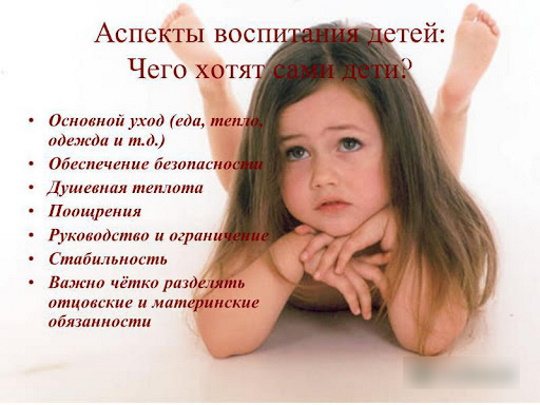
From a psychological point of view, the approach to preschoolers should be based on the following principles:
- patient attitude towards the individuality of each participant;
- understanding the child’s characteristics;
- accepting the child's characteristics.
The preschool period is the most important part of childhood, which is closely related to the instability of emotions in children, incomplete understanding of their role and requirements for behavior.
A set of techniques and techniques that are used in preschool institutions helps children understand which forms of communication are sustainable and which are undesirable in society or the family.
Methods of working with children
Various techniques and techniques are traditionally used within educational institutions.
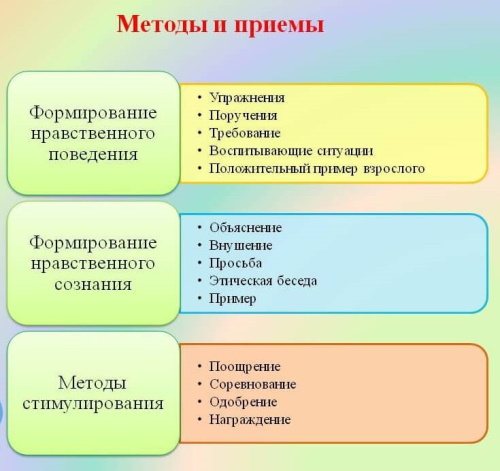
Spiritual and moral education of preschool children: methods and forms
General characteristics of the approaches:
- close connection with the family: parents, guardians, representatives;
- training in performing everyday tasks;
- creating exercises and repetitions;
- stimulating correct behavior;
- inhibition of emotional outbursts;
- demonstration of self-education techniques;
- inclusion of leadership;
- explanation and reproductive activity.
| Basic Techniques | Description and features |
| Training method | This technique helps develop regularity in performing the same actions. |
| Exercise and repetition method | Reception strengthens children's skills and abilities |
| Stimulation | Reception of traditional activity encouragement |
| Braking | Obligatory method of inhibition or censure. He demonstrates with examples what is good and what is bad. |
| Self-education | A way that allows a child to understand that he is important within the community, his desires and actions are real and have consequences |
All techniques that are used to accomplish the assigned tasks belong to one of the categories. Within these categories, they can be divided by type of purpose or method of implementation.
Spiritual and educational
Activities that fall under this category involve studying fairy tales, poems, and stories together with a teacher or parent. While reading, be sure to discuss the actions and characters of the characters.
Fiction for preschoolers always contains an element of moral education. For example, “Turnip” teaches that joint work is much more valuable than individual work. The fairy tale “The Flower of Seven Flowers” talks about how important it is to make a choice between material and spiritual values.
Educational and health
Dynamic games must be included in the education and training program for preschoolers. Outdoor exercise is especially important. Common walks in kindergarten or family outings with children into nature are important.
Cultural and educational
Mandatory methodology based on the study of works included in the category of world values. Children study paintings, sculptures, and musical works. For this purpose, joint trips to museums, theaters, and exhibitions are organized.
For children of primary school age, joint group walks combined with simple project activities are relevant.
Cognitive and labor
This technique is associated with several directions. Children will learn about different methods of making crafts and the materials from which they are made. This is facilitated by joint activities in drawing, modeling, and weaving.
Examples of activities with preschoolers
The spiritual and moral education of preschool children within the framework of the Federal State Educational Standard in practice consists of successive classes, practices, and techniques. They are applicable both at home and in groups at a preschool institution.
Lesson "Family"
The teacher prepares handouts, compiles a questionnaire and organizes the children. After the introduction, the teacher asks the children questions about their parents, brothers or sisters. The teacher tells children about the importance of family, adjusting the information based on age.
Children dance in a circle and then sit on chairs. The teacher shows the children animal cards. Children guess who is whose mother. Completion of the lesson: after the teacher’s question, the children tell what they are called at home, what affectionate names they know.
Spring forest
This lesson introduces primary schoolchildren to the names of trees and natural features. At the beginning of the lesson, the teacher suggests going to the spring forest, but says that this will require using your imagination.
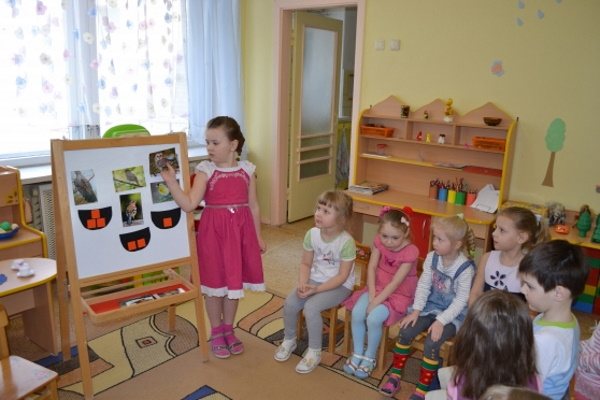
Lesson “Journey to the spring forest”
Children move to a location decorated with decorations and auxiliary materials. The teacher points to the models one by one and asks the children to name what they see. It is convenient to use a forester doll in this lesson, who will talk about the forest and give tasks.
Examples of tasks:
- draw a dandelion;
- remember the poem about spring;
- solve riddles;
- Bring the forester the objects he describes.
At the end of the lesson, the forester thanks the children for their knowledge and help. Separately, he gives a lecture on how important it is to protect the forest and appreciate nature.
Know yourself
The lesson is based on associative techniques. Analogies can be different designs, but it is most convenient to use the example of the structure of a car and the human body.
The teacher demonstrates the machine to the children, shows it in cross-section and asks them to say what the machine cannot work without. Children should gradually conclude that the car needs gasoline. The teacher draws an analogy with a person, tells how blood flows, asks to say what a person cannot live without.
The result of the lesson should be the formation of simple analytical thinking when children learn:
- compare animate and inanimate objects;
- draw analogies;
- take tasks not literally, but learn to reason and think abstractly.
Depending on the age of the children, you can ask arguments on different topics, supplementing it with more complex examples.
Fish
An interesting activity that introduces children not only to the characteristics of fish, but also teaches how to treat them with care. An aquarium is required for this activity. The teacher asks the children to formulate their questions for the fish and ask them through the wall of the aquarium.
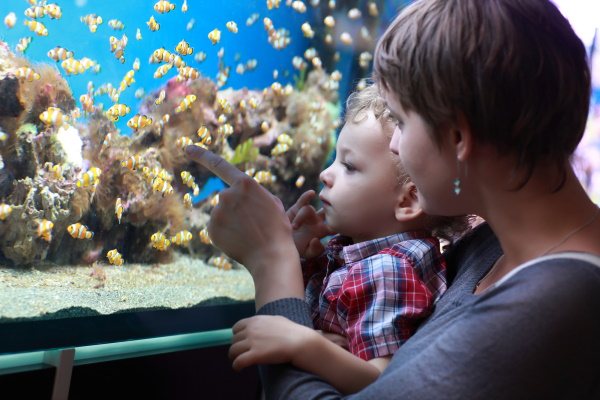
Children must conclude that fish cannot talk. Then the teacher reads a letter on behalf of the fish, where it asks riddles and talks about its characteristics: the structure of the body, the presence of a tail, scales.
Integrated lesson “Water”
For the lesson you will need auxiliary materials: dolls and small basins of water.
First, the teacher conducts language and articulation gymnastics, where he asks the children to alternately touch their eyes, nose, ears, and forehead. Then he talks about how important it is to wash your face morning and evening. The cartoon “Moidodyr” can serve as demonstration material.
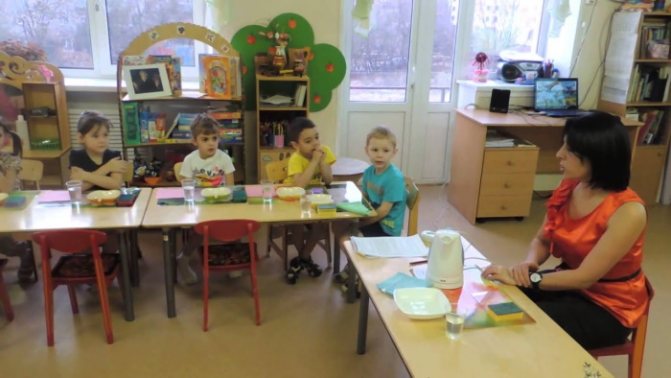
After this, the children, at the teacher’s command, begin to wash their dolls. They help each other in the process. The final stage is reading poetry, accompanied by active motor actions.
The teacher talks about how important water is for a person, what needs to be done to learn how to save resources , how it is customary in society to take care of nature in order to keep rivers and lakes clean.
Working with parents
The spiritual and moral education of preschool children according to the Federal State Educational Standard is impossible without close cooperation between the family and the kindergarten or center. Employees of preschool institutions are also interested in helping parents who find themselves in difficult life situations.
There are several forms of cooperation that are actively practiced.
Questioning
Conducting surveys on various topics makes it possible to study the characteristics of the family and draw up a social passport.
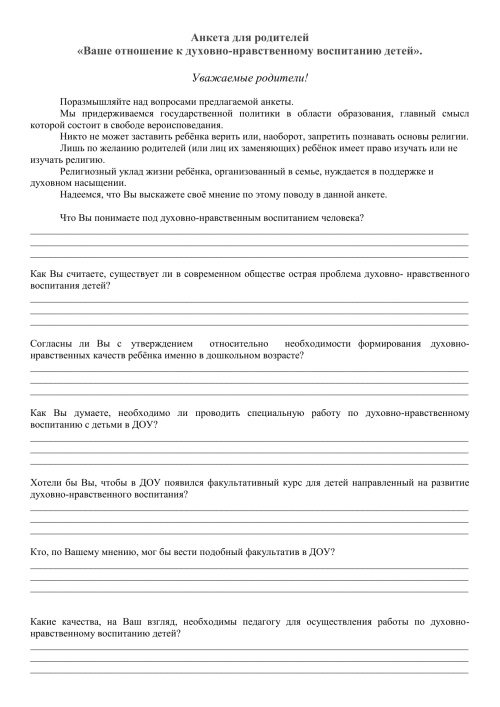
This technique is also practical. If it turns out that the family belongs to the disadvantaged category, then they begin to work with it using a different method.
Conducting parent meetings
These are mandatory accountable events. In recent years, so-called non-traditional parent meetings have become widespread, at which parents are invited to play games and complete quests.
Exhibitions showcasing the works of family creativity
A form of interaction when the teacher communicates not only with the child, but also with his family.
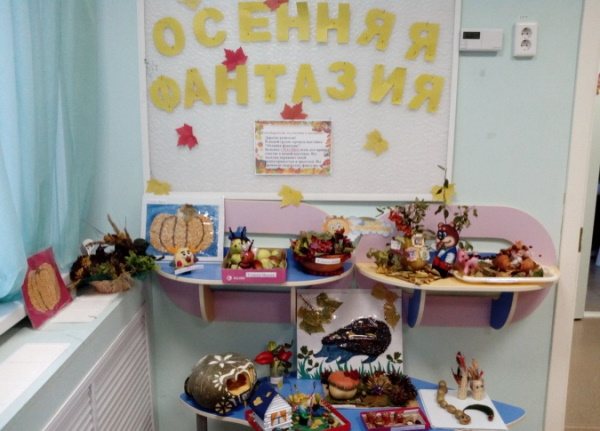
First, the teacher announces the theme of the exhibition, then collects the works and designs them. Those who actively participate are celebrated with various certificates and encouraged.
Conducting master classes for children with parents
These are thematic events to which they invite specialists or organize master classes on their own. The purpose of such events is to organize joint communication between the child and the parent.
Celebrations
This is a traditional technique when, by certain dates, children learn poetry and dances, parents buy costumes and organize tea parties. This practice has existed for a long time, but its forms are constantly changing in accordance with modern requirements.
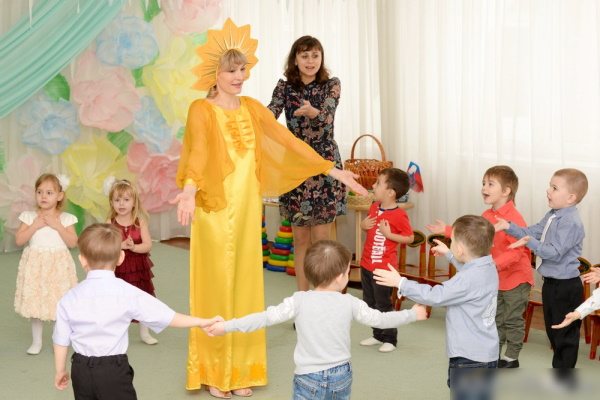
They begin to prepare for the celebration of the “New Year” or “March 8” 1.5 months in advance. In addition, it is considered traditional for preschool educational institutions to hold the “Autumn Festival”, as well as to draw up a program of events dedicated to “May 9”.
Spiritual and moral education, its modern problems
Social and moral education lays down the basic characteristics of the individual, which later make themselves felt, manifesting themselves in behavior and activity. Developed moral qualities are realized through a respectful attitude towards the values of society and the desire to be useful. A moral person adheres to certain boundaries and goals.
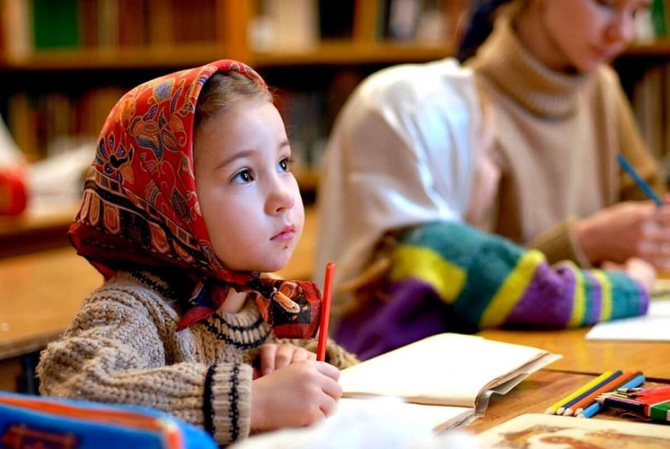
Today, the younger generation is surrounded by many positive and negative influences. The media and various environmental phenomena have a strong impact. The still fragile intellect, young feelings, and unformed sphere of morality are impressed by such basic “values” of modernity as the desire for profit, the desire to endlessly consume and have fun. Following them destroys the country and fragile souls.
Parents are too busy, they rely entirely on the school, but the school has withdrawn from education and is only engaged in teaching. An educational institution should not only teach, but also educate people . Literature and national history should become the basis for development. It happens that teachers of non-humanitarian subjects, chemistry or physics, become moral ideals for their students. A teacher who behaves in accordance with the code that he declares becomes an older friend and a model for growing children.
Tips for parents
The spiritual and moral education of preschool children within the framework of the Federal State Educational Standard is not only the responsibility of educators. Much in the formation of skills and abilities depends on parents and the atmosphere within the family.
Leading teachers and psychologists formulated advice and recommendations for parents:
- Unconditional love. Experts in psychology and psychiatry never tire of repeating that every child should know that he is loved. You cannot impose on a preschooler a system where the love of parents must be earned.

Parental love is important for a child at any age.
- Explanations and reasoning. A preschool child asks a lot of questions. The parent must be consistently available to the child. If a child likes to reason and is interested in various scientific facts, then this interest needs to be stimulated.
- Absence of a system of immoral punishments. Corporal punishment for misdemeanors is a huge miscalculation. Data collected by psychologists and teachers confirm that receiving physical injuries in childhood affects the child’s future, inhibits his development, and leads to psychological problems.
- The presence of traditions and customs. Every family should have customs and traditions: for example, drinking tea with cake on the last day of summer, celebrating Children's Day, special traditions established for celebrating birthdays.
Much has been said about the influence of one's own example. Children are really receptive to what their parents do. If they see that mom and dad are doing their job with pleasure, although sometimes this is due to workload or stress, then they will not be dismissive of choosing their profession in the future.
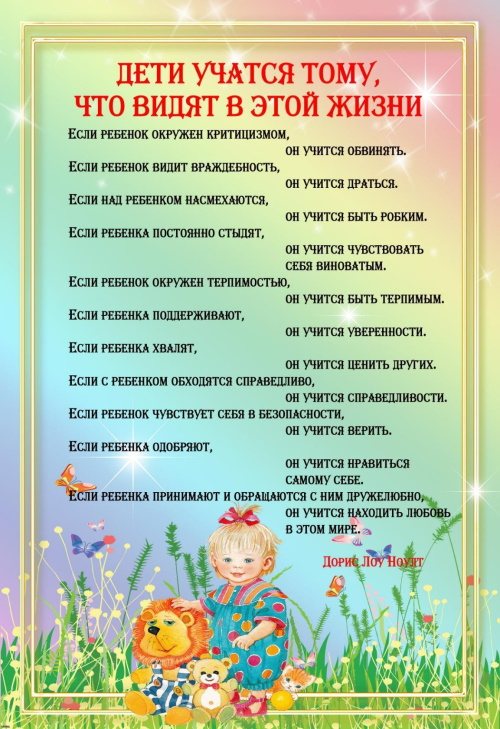
In the case when parents come home, scold their bosses, and curse their professional activities, one cannot expect that the child will behave differently in the future. In addition, a good example for a preschooler is the attitude of relatives towards nature, animals, even traffic rules.
If a parent from early childhood focuses on the need to follow traffic rules, then in the future the child will not even think that it is possible to cross the road when the color is red.
The spiritual and moral education of preschoolers is a whole complex of activities that consist not only of a specially thought-out action plan, but of daily activities that sometimes seem unimportant to adults.
Within the framework of the Federal State Educational Standard, a special educational program is being implemented aimed at creating a special environment for the development of children. At the same time, parents must understand how important their contribution to education is, how great and unique their role is.
Provisions of the educational standard
Since 2013, the Federal State Educational Standard has been included in every educational system. Within the framework of these standards, educational programs are created aimed at the development of children, in particular preschoolers. The provisions of the Federal State Educational Standard are based on the following conditions:
- various methods to diversify the childhood of wards;
- comprehensive development of the child;
- socialization through interaction with adults and children;
- respect for the personality of a preschooler;
- maintaining emotional well-being and psychological health;
- a special form of presenting information through creative activity, fairy tales, and research activities.
Particularly important is the moral and patriotic education of preschool children, which forms love for the country, pride in their people, and the desire to enrich the culture. The foundations of patriotism are laid in the family, while the methods of work of educators consist in developing and enriching the experience already gained. The provisions of the standard also emphasize the significance and characteristics of each age period. Classes are conducted in an unobtrusive environment, in a playful way or through a fairy tale, reflecting in the main characters the concepts of kindness, honesty, and courage.
